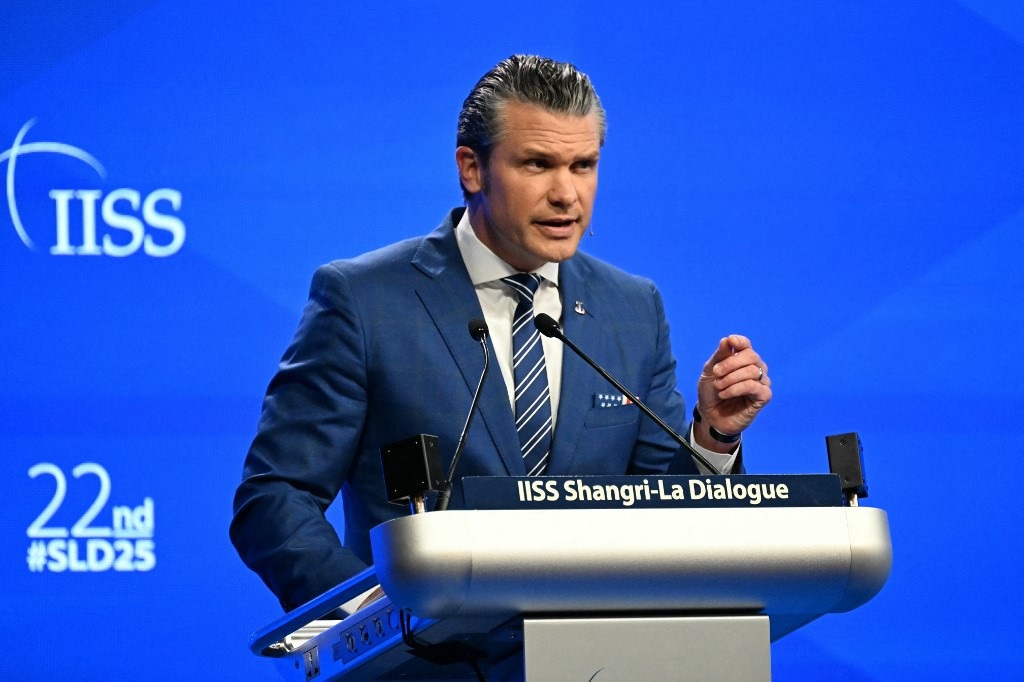In a recent speech, US. Secretary of Defense, Pete Hegseth described China as a nation striving to become a dominant force in Asia, asserting that it aims to extend control over numerous regions within the continent.
The Guardian report of Saturday, May 31, 2025, quotes Hegseth as saying Beijing’s ambitions are not limited to economic or political spheres.
He said China intends to extend dominance to territorial dominance, particularly in areas such as the South China Sea.
The South China Sea is reportedly where China has long been entangled in disputes with several of its neighboring countries over overlapping territorial claims.
Hegseth warned that China is not only expanding its influence through economic and diplomatic means.
According to him, China is also actively preparing for the potential use of military power to reshape the regional balance.
He specifically mentioned concerns over China’s military developments with regard to Taiwan.
Referencing a timeline that has circulated among U.S. officials and military leaders, Hegseth noted that Chinese President Xi Jinping is believed to have set a target for the Chinese military.
According to him, this is for the Chinese military to be capable of launching an invasion of Taiwan by the year 2027.
This deadline has been repeatedly cited by American defense sources.
However, it has not been officially acknowledged or confirmed by the Chinese government.
Highlighting the seriousness of the situation, Hegseth emphasized that China is actively working toward this military capability.
He pointed out that China is not only building the necessary military infrastructure but is also conducting regular training exercises and rehearsals aimed at preparing its forces for a potential conflict.
This sustained military buildup and preparedness indicate a credible threat that Beijing may consider using force to assert its territorial ambitions in the region.
“Let me be clear,” Hegseth stated, “any attempt by Communist China to conquer Taiwan by force would result in devastating consequences for the Indo-Pacific and the world.”
He underscored that the threat posed by China is both real and potentially imminent.
He expressed hope that such a conflict can be avoided.
On the other hand, he stressed that it remains a genuine risk that must be taken seriously by regional and global stakeholders alike.
The speech was delivered during the Shangri-La Dialogue.
It is an annual security summit held in Asia that has traditionally served as a key platform for both the United States and China to articulate their strategic visions and court influence among Asian nations.
The forum typically allows these two powers to communicate their policies, build partnerships, and sometimes engage in direct dialogue over contentious issues.
This year’s dialogue, however, has revealed a notable shift in participation dynamics.
The United States reportedly dispatched one of its most substantial delegations in recent memory.
This reflected the Biden administration’s increased focus on Indo-Pacific security.
On the other hand, China took a significantly different approach.
Instead of sending a high-ranking delegation, Beijing opted for lower-level representation.
Also, it unexpectedly cancelled its scheduled speech, which was originally planned for Sunday.
China has not provided any explanation for its scaled-back presence or the withdrawal of its speaking engagement.
This raised questions about its current diplomatic posture and willingness to engage in public dialogue regarding its regional ambitions.
The absence of a formal speech by the Chinese delegation has left a gap in the discourse.
This is at a time when tensions in the Indo-Pacific are particularly high and strategic clarity is urgently needed.
Hegseth’s remarks, set against the backdrop of the Shangri-La Dialogue’s evolving dynamics, serve as a stark reminder of the growing strategic rivalry between the U.S. and China in Asia.
His statements reflect deepening concerns within the American defense and political establishments over China’s military intentions.
This is particularly in relation to Taiwan, and underscore the broader geopolitical contest over influence in the region.
In summary, Hegseth delivered a pointed message warning of China’s rising military ambitions and the risks they pose not only to Taiwan but to regional and global stability.
The subdued participation by China at the dialogue supposedly added to the gravity of the moment.
This is as it hinted at growing disengagement or reluctance to openly address the escalating tensions in the Indo-Pacific.







